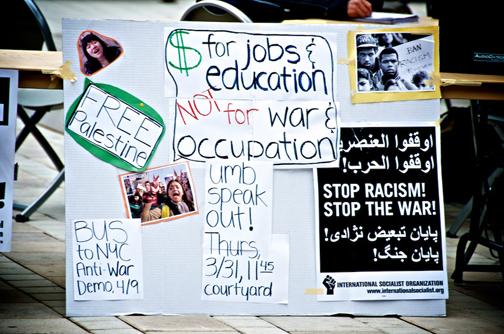If you’ve been following the news, this has been an astonishing summer. Unrest and revolution continues to sweep the planet.
For anyone who is fed up with the way things are in this country – the corporate and government hypocrisy, the daily racism and sexism and homophobia, the environmental destruction, ongoing U.S. occupations and wars – we have seen that another world is possible. After years of working people accepting less while the rich take more and more, people around the world are demanding something different.
But many people don’t yet believe an alternative is necessary. We’ve been told we live in the best system. We need to reject obvious lies like this. Looking at recent events even in this country can shed light on how messed up the current state of affairs truly is.
This year Dominique Strauss-Kahn, a transnational bureaucrat from the International Monetary Fund (IMF), raped a hotel worker. According to the media, people like the victim (a poor woman or a person of color) will publicly accuse a wealthy person of rape just to get rich. Only in a society with deep-rooted sexism and racism could such a story be believed.
This slander had its intended effect. Despite DNA evidence and a history of sexual violence, the prosecution recently dropped the case against Strauss-Kahn.
Meanwhile, in San Francisco, Bay Area Rapid Transit (BART) police continue their violent racist campaign. Just this summer, BART police shot unarmed 19-year old Kenneth Harding for skipping out on paying a $2 transfer bus fare. In an eyewitness video you can view on YouTube, the police stood by and refused to administer medical aid while wounded Harding bled to death on the sidewalk.
The message from the injustice system is clear: if you’re a millionaire with connections to the financial elite, you can get away with rape. If you’re a young poor person of color who doesn’t pay his $2 bus fare, you can be killed.
Whether it’s the corporations and banks who received trillions in bailouts, or the governments that are demanding we pay the bankers’ debts through spending cuts, they’re all on the same side.
The debt ceiling “debate” perfectly illustrates on what side of the fence both Democrats and Republicans are. After renewing tax cuts on the wealthiest Americans (costing $300 billion a year of taxpayers’ money), setting the highest Pentagon budget ever (over $700 billion), and the financial bailouts ($9 trillion in loans at rock-bottom interest rates), both parties suddenly say we need fiscal responsibility.
And what was the “fiscally responsible” deal we got? $2.1 trillion in spending cuts over the next 10 years mostly from social programs ($900 billion to be cut this year), and no new taxes on the wealthy or corporations. Obama put Social Security and Medicare on the bargaining table. And what about the $350 billion cut from Defense spending? Most of it comes from military pay, veterans’ healthcare, and the post-9/11 GI Bill.
In this country, 45,000 workers up and down the East Coast went on strike when Verizon, a company that made around $10 billion last year and paid zero taxes, demanded huge concessions from workers’ benefits and overtime pay.
The central demand to all of these events is this: in a world of vast abundance like ours, we need a society based on the collective needs of the majority, not the selfish whims of the wealthy elite.
That very attractive idea is the basis of socialism – working people taking control of society to organize it on the basis of need, and not profit. This isn’t just a pipe dream, but something both possible and urgently necessary.
Our side will need to be organized enough to win. The rich have the media, the state, and vast resources to draw upon to hold back systemic change. In order to for us to win, we need organization to keep the movement marching forward, to win greater layers of people to fight for social change, and to hold a clear political perspective that won’t fold at critical points.





















































